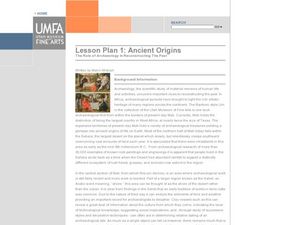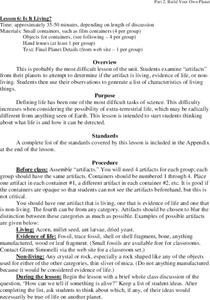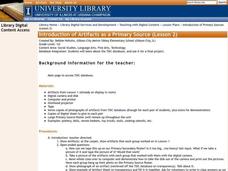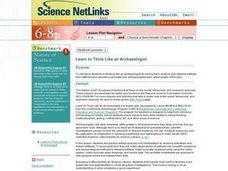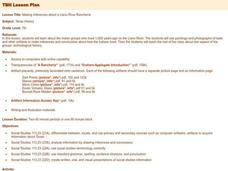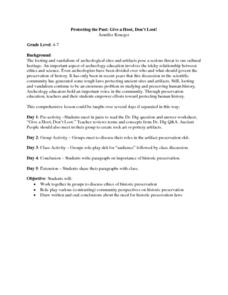Curated OER
Teddy Bears
First graders discuss the difference between old toys and new toys. In this toys lesson plan, 1st graders bring their teddy bears to school and determine which is oldest and which is newest. They then discuss how a curator at a museum...
Curated OER
Ancient Origins: The Role of Archaeology in Reconstructing the Past
Students read information about the ancient origins of art and archaeology with a focus on the Malian culture. In this art origins lesson, students read background information for the topic and compare ancient and contemporary objects....
Curated OER
Major Archaeological Discoveries of China in Recent Years
In this archaeology of China worksheet, students complete a 12 page packet of activities and questions. Students learn about restoration of relics and the history and culture of China as revealed in archaeological artifacts. Questions...
Curated OER
Heroes and Hoplites for a Day
Students consider the accomplishments of the Greeks. In this ancient Greece lesson plan, students take a closer look at Greek artifacts, history, and culture as they visit the suggested museums and their websites.
Curated OER
Lincoln Home National Historic Site: A Place of Growth and Memory
Eighth graders study the history of Lincoln's home. In this American History lesson, 8th graders examine artifacts from his home to learn about his beliefs. Students participate in a webquest on Lincoln's home.
Curated OER
Garbage Can Archaeology
Young scholars explore the use of stratigraphy to date objects by sorting the material in the wastebasket. They make a list of actual items from the garbage can and their possible uses and categorize the artifacts.
T
Curated OER
Ecuadorian Highlands Lesson
Indigenous peoples resided in the highlands of Ecuador as far back as 5,000 B.C. To learn about the lives of these people, class pairs research the farming and the building methods, the arts and crafts, and the beliefs of the early...
Curated OER
Methods of Mystery
Students utilize the scientific method to discover the age of an item. In this historical dating lesson, students compare and contrast a 400 year old cabinet to one made within a few years by using carbon dating. Students complete a...
Curated OER
Draw Like an Egyptian
Young scholars discover the cultural history of Egypt by illustrating Egyptian figures. In this art history lesson, students analyze the Egyptian styles of figure drawings and emulate that by creating their own illustrations using an...
Curated OER
All Things Chinese-- Building a Classroom Museum
Students explore China. In this introduction to Chinese culture lesson, students bring in items or pictures from home that represent Chinese culture. Students create a "Chinese museum" by putting these labeled items on display, adding...
Curated OER
Is It Living?
Young scholars investigate the definition of life and alive in the context of a unit that is involved with building their own planet. They participate in a class discussion about defining life, and in small groups analyze artifacts to...
Curated OER
How To Think Like An Archaeologist
Young scholars take a field trip to historical Jamestown. Using artifacts given to them, they must identify them and discover who would have used them and for what purpose. They create a database to organize the information and share...
Curated OER
Introduction of Primary Sources: Introduction to TDC site (Lesson 3)
First graders are introduced to using a database as a primary source. Using the internet, they choose a site of artifacts and practice navigating through the site. They identify an artifact and draw them on a large piece of white...
Curated OER
Tall Tales: Reconstructing A Personal Tell
Sixth graders discover the ways archaeologists examine artifacts and where they are found. After being introduced to new vocabulary, they use artifacts from their own lives and discover what could be told about their life from them. ...
Curated OER
Introduction of Primary Sources
Students will use the internet to access information about artifacts to justify their use as primary sources of information. The activities can be done as a whole class or in groups. The differences between primary and secondary sources...
Curated OER
2 x 2
Learners work together to grid a 2 x 2 meter unit using the formula for the Pythagorean Theorem. After creating the grid, they identify the location of artifacts and create a map of their location. They develop a graph and table of their...
Curated OER
Pottery Analysis
Students study how archaeologists analyze artifacts to answer questions about past cultures. They explain why pottery is important to archaeologists and how they use classification to answer their research questions.
Curated OER
Leaarn to Think Like an Archaeologist
Learners examine how to act as archaeologists by examining artifacts. The inquiry is meant to teach learners about analysis of ancient civilizations and scientific finds. Fossil evidence is also covered to make connection to the...
Curated OER
Why Archaeologists Dig Square Holes
Students examine how archaeologists establish and maintain the context of artifacts. They interpret a plan view of an archaeological site and explain the importance of the grid system.
Curated OER
Making Inferences About a Llano River Rancheria
Seventh graders research the Indian groups that lived 1,000 years ago on the Llano River. They analyze paintings and photographs of tools and artifacts, develop inferences and conclusions about how the Indians lived, and present the...
Curated OER
Ethics in Archeology
Students discuss their views about archeological site protection. They analyze different dilemmas dealing with this issue and discuss. They discover the importance of protecting artifacts and archeological sites.
Curated OER
Protecting the Past: Give a Hoot, Don't Loot
Learners discuss the looting and vandalism of various archeological sites. In pairs, they read and complete a worksheet and review their answers as a class. In groups, they role play a artifact preservation skit and perform it to their...
Curated OER
Wisconsin
Fourth graders brainstorm a list of places they have visited in Wisconsin. They watch a video "Cultural Horizons." Students use the CD and find on a map several locations in Wisconsin. Students bring in photos, pictures, and artifacts...
Curated OER
Gridding An Archaeological Site
Students investigate using some of the basic skills of an archaeologist while using a Cartesian coordinate system. They establish a grid system for a dig site and determine the locations for different artifacts. Students use the...
Other popular searches
- Inca Artifacts
- Cultural Artifacts
- Archeology Artifacts
- Indian Artifacts
- Artifacts and Archeology
- Native American Artifacts
- Historical Artifacts
- Ancient Cultures Artifacts
- American Artifacts
- Artifact Protection
- Artifact Classification
- Ancient Chinese Artifacts



